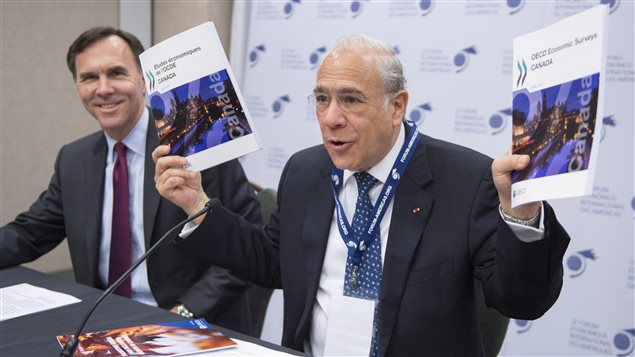The new Liberal government ought to continue sharing more of the fruits of Canada’s growth with the country’s Indigenous population, says a new report presented today at the opening of the 22nd International Economic Forum of the Americas Conference of Montreal.
The latest Economic Survey of Canada prepared by the Organization for Economic Co-operation and Development (OECD) was presented by OECD Secretary-General Angel Gurría and Canada’s Finance Minister Bill Morneau at the three-day conference attended by dozens of leading politicians, civil society representatives and business figures from Canada and across the globe.
Canada should be improving outcomes for its Aboriginal Peoples through providing more resources for their education, training, health care, housing, entrepreneurship and environmental infrastructure servicing their communities, says one of the key recommendations of the survey.
Young but poor
While Canada scores highly in all dimensions of the OECD’s Better Life Index, the country’s 1.4 million Indigenous citizens (4.3 per cent of the population) suffer from various critical social problems, says the report.
On average, Indigenous Canadians are much younger than other Canadians and are growing quickly in number. Yet they are often poor and are more likely than other Canadians to live in sub-standard housing, to drop out of school, to take up smoking and heavy drinking, to suffer from health problems, to commit suicide and to have their children grow up in lone-parent or foster homes, says the survey.
They are also almost 20 per cent less likely to be employed than their non-Indigenous counterparts.
The report says Indigenous Canadians represent an important and currently underutilized labour force resource, especially as the country’s population continues to age.
Additional policies are also needed to boost productivity, reduce financial stability risks and make future growth stronger, greener and more inclusive, said the report.
Continuing headwinds
The survey projected GDP growth of 1.7 per cent this year and 2.2 per cent in 2017, as the economy shifts away from its reliance on resource-based sectors amid continuing weakness in oil and mining.
“The Canadian economy is proving resilient, but continues to face headwinds from the low growth trap facing the global economy,” Gurría said. “Canada’s economic policy settings are appropriate, given the risky international environment, but there is still scope for reforms to boost competition, stimulate business dynamism and ensure better economic outcomes for all Canadians.”
Some of the other key recommendations include eliminating the high barriers to competition in network sectors and reducing foreign ownership restrictions in air transportation, telecommunications and broadcasting.
Morneau said that the Liberal government’s plan to revitalize the Canadian economy is gaining international recognition and strengthening Canada’s presence on the world stage.
“Canada’s economic approach is based on the principle that when you have an economy that works for the middle class, you have a country that works for everyone,” Morneau said.







For reasons beyond our control, and for an undetermined period of time, our comment section is now closed. However, our social networks remain open to your contributions.